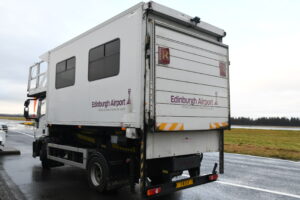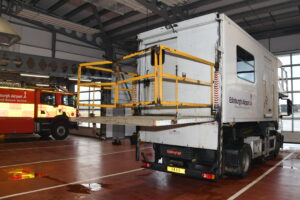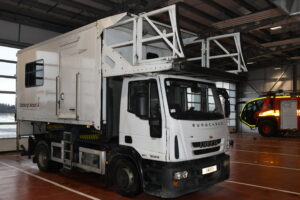- James Young died in hospital more than a week after the fall
- Locking fault on “ambulift” had been in place for some time before incident
- HSE guidance is available on the maintenance of work equipment.
The owner of Edinburgh Airport has been fined £80,000 after a pensioner fell from an ambulift on his return from holiday.
Following the fall, James Young was admitted to hospital, but died more than a week later from his injuries .
The 81-year-old had just landed at the airport after holidaying on the Greek island of Rhodes with his wife Anne, when the incident happened on 28 November 2023.

Mr Young and his wife, who has mobility issues, had been waiting for one of the airport’s ambulifts to assist them disembarking the aircraft shortly after 4pm. The couple had been two of six people requiring the assistance of the ambulift following the flight.
Ambulifts are a specially designed vehicle to assist passengers with reduced mobility. Edinburgh airport has several such vehicles which are owned, maintained and operated by the airport and driven by its employees.
Passengers who cannot embark or disembark using the aircraft steps can use an ambulift cabin, which is capable of being elevated to the level of the aircraft’s door and lowered to the chassis of the vehicle. At the rear of the vehicle, a tail lift platform is then deployed to the same level as the floor level of the passenger compartment.

Passengers then exit the compartment onto the tail lift, which unlike the compartment, is not enclosed, but has safety side rails and a rear gate around its perimeter. Once secure on the tail lift, it is lowered to ground level, allowing its users to move on to the tarmac step free.
Mr Young attempted to pass a piece of hand luggage to a worker on the ground whilst the tail lift had not yet been lowered. It is believed he leant against the safety rail, which swung open causing him to fall approximately five feet to the ground below.
He was assisted to his feet and helped into a wheelchair and although he wasn’t thought to have sustained serious injury at time, he was taken to hospital. When examined at Edinburgh Royal Infirmary, it was found Mr Young had sustained serious injuries and he subsequently died on 7 December as a result of these injuries.
As a result of the incident, Edinburgh Airport Limited submitted a RIDDOR to the Health and Safety Executive (HSE) and an investigation was carried out. That found that when it was raised from the ground, the locking mechanism on the tail lift’s safety rail was misaligned, meaning it could potentially open outwards if pressure was applied to it. When the safety rail moved outwards from the lifting platform an open edge was created and it was through this that Mr Young fell.

The Provision and Use of Work Equipment Regulations 1998 require every employer to ensure that work equipment is maintained in an efficient state, in efficient working order and in good repair. Equipment must be maintained so that its performance does not deteriorate to the extent that people are put at risk. HSE guidance is available on the maintenance of work equipment.
Edinburgh Airport Limited pleaded guilty to breaching Regulation 5(1) of the Provision and Use of Work Equipment Regulations 1998 and Section 33(1)(c) of the Health and Safety at Work etc. Act 1974. The company was fined £80,000 at Edinburgh Sheriff Court on 10 June 2025.
HSE inspector Jurate Gruzaite, said: “Edinburgh Airport Limited had a duty to ensure all of its work equipment was maintained in an efficient state and in working order. The company failed in this duty and had a role in a family tragedy that unfolded the moment Mr and Mrs Young returned from holiday.
“It is clear that the fault on the ambulift had been in place before Mr Young fell from the platform.
“We can only hope this tragic incident is one the industry can learn from.”
Further information:
- The Health and Safety Executive (HSE) is Britain’s national regulator for workplace health and safety. We are dedicated to protecting people and places, and helping everyone lead safer and healthier lives.
- More information about the legislation referred to in this case is available.
- Further details on the latest HSE news releases is available.
- HSE does not pass sentences, set guidelines or collect any fines imposed. Relevant sentencing guidelines must be followed unless the court is satisfied that it would be contrary to the interests of justice to do so. The sentencing guidelines for health and safety offences in Scotland can be found here.